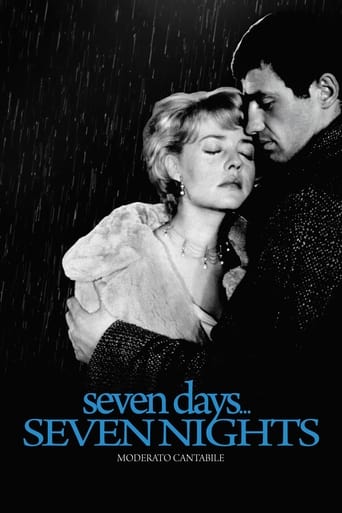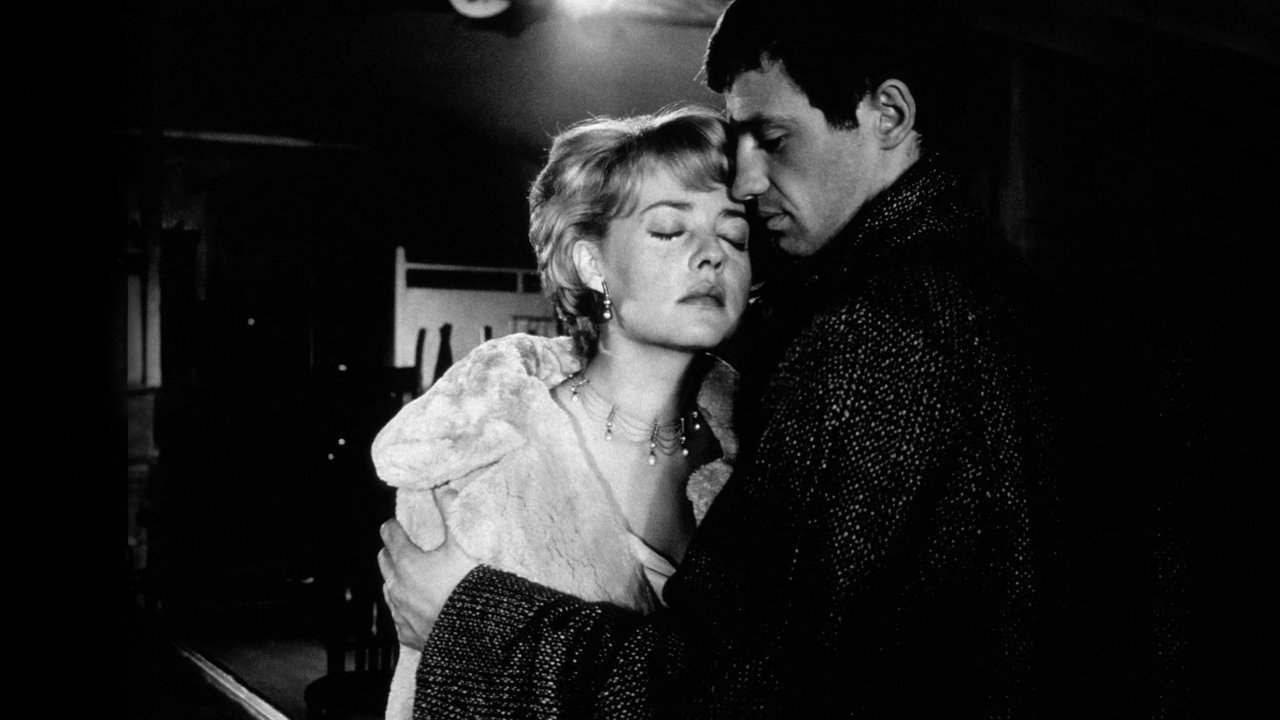Charlot47
The story is extremely simple. When a woman is murdered in a bar, the bored wife of a local employer becomes obsessed with her fate and discusses it with a witness, an unemployed man who used to work for her husband. Without much secrecy the two progress into an intense but unconsummated affair, never even kissing. Yet, like all affairs. it has to end. What counts is the way the story is told. Visually it is striking, in atmospheric black and white widescreen set wholly in bleak winter light in an unromantic little Atlantic port. Workmen in berets and women in headscarves trudge about, while the rich travel in nothing more exciting than a Peugeot. Aurally, the score is mostly the Diabelli sonatina labelled "moderato cantabile" that the woman's child is learning, its light charm a contrast to the darkness of the story. In the bar the jukebox blares out jazzy Latin numbers while sirens from ships and factories interpose a melancholic note.Of the two principals, Jeanne Moreau is the perfect incarnation of a sexy bourgeoise full of unfulfilled longings: the film is worth seeing more than once for her alone. As her nearly-lover, Jean-Paul Belmondo performs manfully and is always interesting to watch, but looking gloomy without animation and conversing literately without any cheerful obscenities are not what we want from him (he was not so happily cast in "La Ciociara" the same year either). Talking is what the two lovers do, this being a French film, but like "L'Année dernière á Marienbad" the dialogue is from a novel not from life. By inserting this layer of artifice over what might have been said in reality, the couple are distanced from boss's wife and out of work man and their affair becomes not real but a product of imagination. While highly dramatic, the agony of the wife is however close to the truth of a woman's heart into which men, whether unfeeling husband or cautious lover, can never quite see. PS For people who enjoy bourgeois rituals being disrupted, like the wedding reception in "Melancolia" or the post-opera gathering in "El ángel exterminador", the dinner party at the climax of this film is a small joy. Shortly beforehand, the wife nips out to the local bar that is full of working men and downs several wines. Once at table, after just managing the fish, she loudly refuses the meat and rushes away to be sick. Not the perfect hostess in 1950s provincial France.PPS Not a few similarities with the 1956 film "Le Sang à la tête" based on a Georges Simenon book "Le Fils Cardinaud". In both, the major employer of a West Coast port loses his neglected wife temporarily but publicly to a young working man.
Bob Taylor
This has to be one of the dullest films of the early Sixties. Remember that Godard, Malle, Truffaut and company had been challenging the traditions of story telling; the world seemed young again, and full of possibilities. Moderato cantabile has nothing of this spirit. It might have been made by an old-guard director like Clément or Delannoy (if they had decided to take a chance on a Duras script).There isn't much energy or interest in this story: what happens in the first ten minutes is endlessly rehashed throughout the remainder. Belmondo is ill at ease here, or at least seems that way to me--there is no chance for any extroversion, exuberance or even anger from the character. Jeanne Moreau is used decoratively (Brook must have seen what Resnais was able to do with Delphine Seyrig in Last Year In Marienbad) and always looks elegant, if never really desperate or anguished. You know something's wrong when the piano teacher provides much of the dramatic interest: she's bullying the child into giving her a Diabelli sonata "moderately, with a singing feeling".Note: I have just remembered that Clément did do a Duras script (Barrage contre le Pacifique) in 1958.
carvalheiro
"Moderato cantabile" (1960) directed by Peter Brook was a movie with a certain spleen of its weather, like a love story in a foggy atmosphere near or not too much far away in Gascogne Gulf from the quite distant channel between England and France. The couple had met in a coffee break at the place of the port and both were seeing each other concerning a criminal environment from the daily journey, nowhere outside with the police searching for somebody helping to solve the killing of someone there. Director Peter Brook so happy with his career, that he forgot perhaps in making more movies like this one, even though this one it was not so easy in finishing it, but that unfinished touch is not evanescent. This kind of appearance from the main characters, a woman with a child and a man, both young and the message it was there like that. A stylish look for both main characters that knowing something else about an event have an approach to a soft sentimental adventure and forgotten the reality of their acquaintance created a link of friendship without any presumption for after tomorrow. Because it seems if did you understood that, something is always possible when things are confused for the minds and the first is breathing well and expelled oxygenate air, making steam by night : reconciliation brought her for another stand of high society from the time. It seems also that the screenplay came from someone who had much pleasure to bring any confusion in the mind of the characters with her - because is a she - deconstruction in her obsessive purpose, that life is not so important around if a kiss save your honor and butterfly. This is the strength of Marguerite Duras story adapted anyway by Peter Brook with a kind of innovative and quite prejudice against savagery of the time, during persecutions in France, because colonial defeat at the time mixed with resistance from Gironde tradition where the story came from.
mackjay2
Peter Brook's MODERATO CANTABILE was praised in its day, but has nearly been forgotten. Not a crowd pleaser, this is a film that will probably appeal to a limited audience. The screenplay is based on the Marguerite Duras novel of the same name. Duras deliberately avoided dramatic incident for the main characters and wanted to only observe their interior states. In the film, Brooks tries to find an equivalent for this approach and he succeeds. From the opening scene, we can see we are in for an unusual type of film experience. A young boy is in the middle of a piano lesson. We see his teacher react with impatience to the boy's distracted dreaminess. The boy's mother, Anne (Jeanne Moreau), tries to keep him on track, but little is accomplished. Then, a woman's scream is heard from outside the window. Boy, mother and teacher look out to see a great deal of commotion and police presence in front of a café next door. When the woman goes down to look, she sees a female corpse in the café and a man being led away by police. Surreptitiously watching Anne is Chauvin (Jean-Paul Belmondo). For the first third of the film, he will follow the mother and son around the town (Blaye, near Bordeaux). Idly rich and bored, the pair have little to do but wander in the woods and ride the ferry across the dull, gray Gironde river. Chauvin has little to do himself and one day he approaches Anne. After a short time, they begin a romance. The romance is presented in a very muted, unprovocative way. What is interesting about it is the way that Anne insists on Chauvin narrating his rendition of the story behind the shot woman and the man in the café. It's clear that an analogy is being made between that couple and the film's protagonists. The drama in this story happens to other people, not to the main characters. Clandestine meetings continue and at one point Chauvin decides he has had enough of Anne's need to live a vicarious tragedy. He puts her off and refuses to continue. The film goes to great length to express the isolation of these characters: a bored, lonely rich man's wife in an enormous estate and a solitary factory worker (we are only told he works there, we don't see it). Brooks and his cinematographer Armand Thirard do a fine job of establishing the overwhelming melancholy of this story. Locations are used to express the characters' emotional states in much the same way that Antonioni uses locations in his films. This film seems to be saying that some are trapped in their lives and there is only temporary, perhaps imagined, escape from the dull greyness of it all. A piano sonatina by Diabelli is the only music used for the soundtrack and its Mozartean prettiness seems at odds with the somber tale, perhaps a small touch of irony. Or perhaps an expression of the way small amounts of sunlight can be let into a gray world, singing, but with moderation.


 AD
AD

